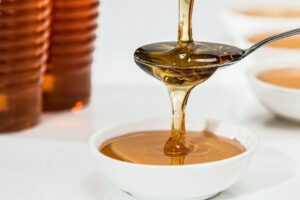
Why you should avoid feeding honey to an infant
Ghaida Batarseh Havern, Michigan State University Extension – June 02, 2023
Updated from an original article written by Jeannie Nichols, Michigan State University Extension.
Honey may contain Clostridium botulinum spores, which can lead to infant botulism illness.

According to the Centers for Disease Control and Prevention (CDC), in 2018 there were 242 reported cases of botulism per year in the United States. Infant botulism accounts for most botulism cases each year, with 67% of those reported cases from 2018 diagnosed in infants.
Infant botulism occurs when an infant ingests spores of the Clostridium (C.) botulinum bacteria. The spores grow in the baby’s intestines and release a neurotoxin. A neurotoxin is a poison that impairs normal functioning of the nervous system. These spores are naturally found in nature, dirt, dust, water and even air. The spores may contaminate honey. C. botulinum is not a disease of honeybees; rather, C. botulinum spores are a rare, accidental contaminant that may be carried into the hive on dust or in water.
The CDC and the American Academy of Pediatrics recommend that honey not be given to babies younger than one year of age, since honey is a potential and avoidable source of C. botulinum spores. Babies under 12 months of age have not yet developed a strong enough immune system to prevent the spores from releasing the neurotoxin within their gastrointestinal tract. This can cause severe illness in infants. For this reason, avoid giving an infant any form of honey until the infant reaches at least 12 months of age. Symptoms of infant botulism include (but not limited to):
- Constipation.
- Eyelids sag or partially close.
- Infant appears “floppy.”
- Weak gag and sucking reflex.
- Loss of head control.
- Loss of facial expression.
- Paralysis that spreads downward.
- Respiratory failure.
According to the CDC, infant botulism is a medical emergency and warrants immediate medical care.
For more information on food safety during infancy, visit MSU Extension’s Safe Food = Healthy Babies website for resources and articles.
This article was published by Michigan State University Extension. For more information, visit https://extension.msu.edu. To have a digest of information delivered straight to your email inbox, visit https://extension.msu.edu/newsletters. To contact an expert in your area, visit https://extension.msu.edu/experts, or call 888-MSUE4MI (888-678-3464).




